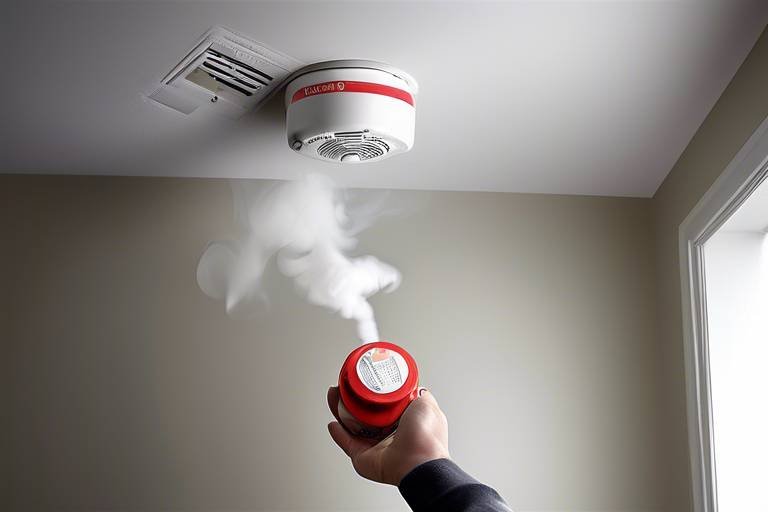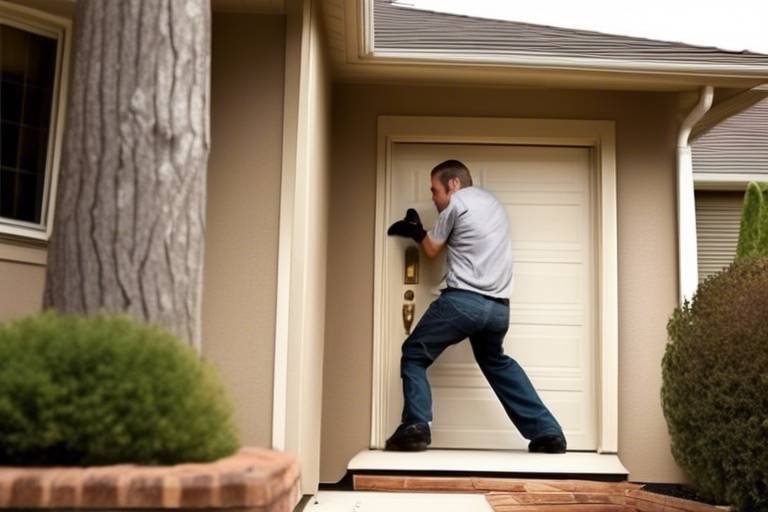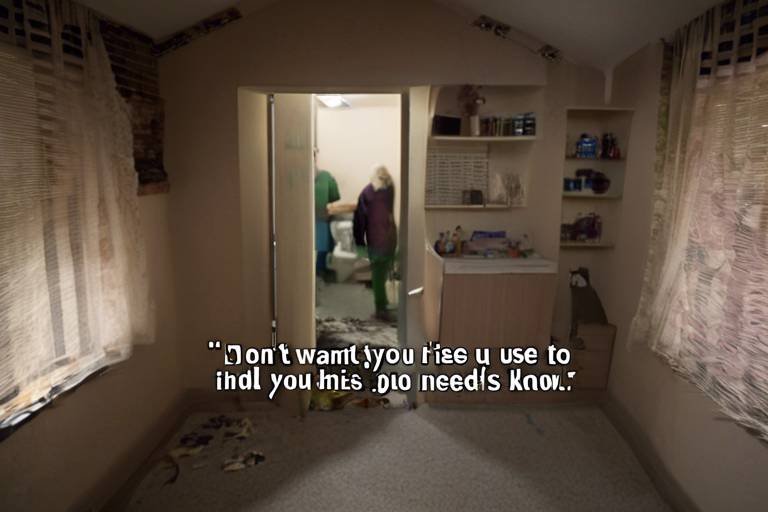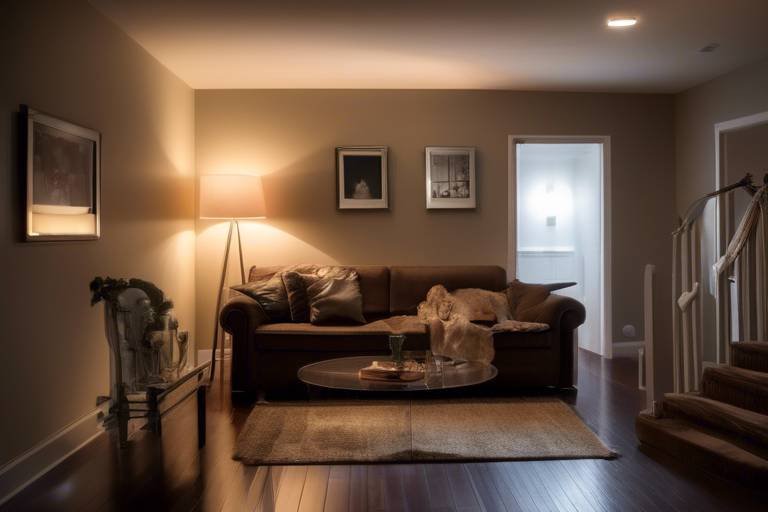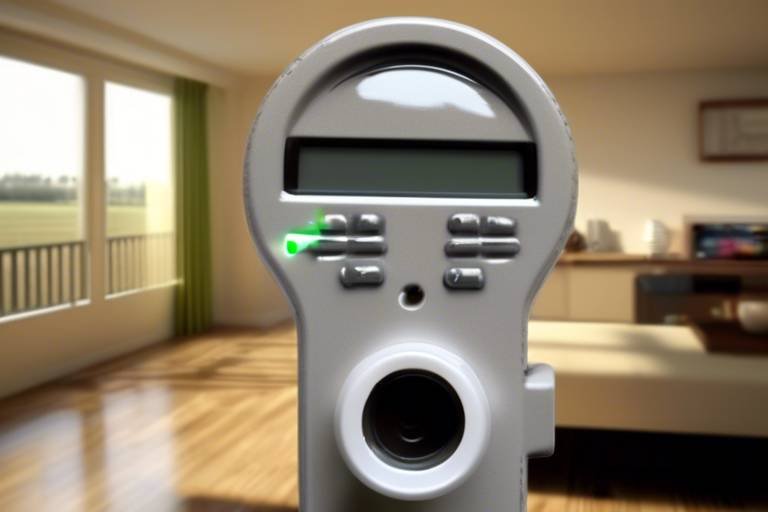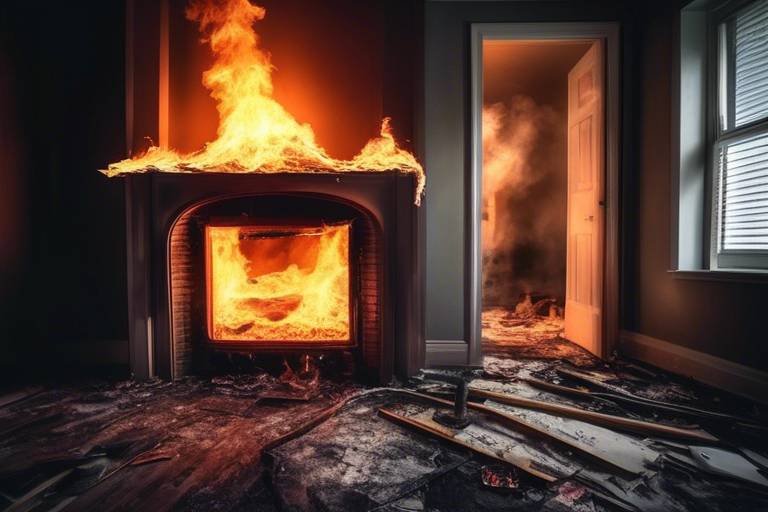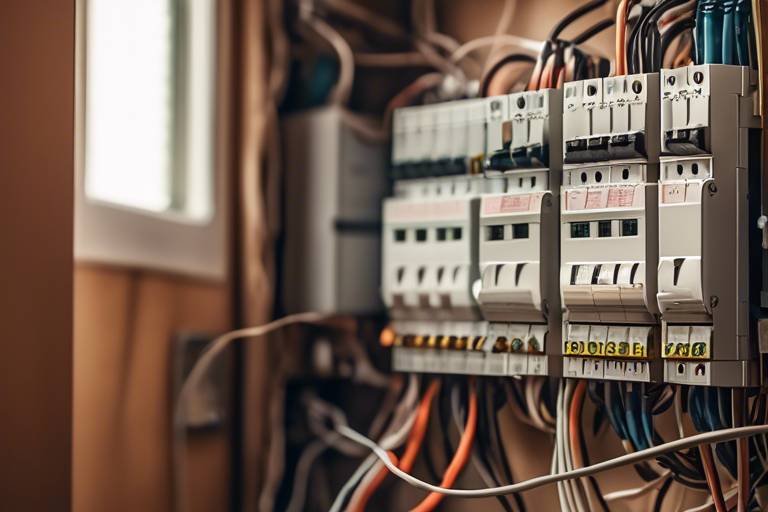Smoke Alarms - Wired or Battery Operated
When it comes to fire safety in our homes, smoke alarms are a non-negotiable necessity. The choice between wired and battery-operated smoke alarms can be a bit overwhelming. After all, both types have their own unique benefits and drawbacks. But don’t worry! This article is here to break down the nitty-gritty details, making it easier for you to choose the right option for your home. Think of it as a friendly guide through the maze of fire safety devices, ensuring you come out on the other side with the best protection for your loved ones.
Imagine waking up in the middle of the night to the shrill sound of a smoke alarm. It’s a terrifying thought, but having a reliable alarm can make all the difference. Wired smoke alarms are often hardwired into your home’s electrical system, which means they’re always powered and less likely to fail due to dead batteries. On the flip side, battery-operated alarms are portable and can be installed anywhere, making them incredibly versatile. Both types have their own merits, and understanding these can help you make an informed decision.
In this article, we will explore the advantages and disadvantages of both wired and battery-operated smoke alarms. We’ll dive into their installation processes, maintenance requirements, and long-term cost implications. By the end of this read, you’ll be equipped with the knowledge to choose the smoke alarm that best fits your lifestyle and home safety needs. So, buckle up and let’s get started on this journey toward a safer living space!
Smoke alarms come in various types, each designed for specific needs. The most common types are wired and battery-operated alarms, and each has its own unique features and functionalities that cater to different preferences and situations.
Wired smoke alarms are connected directly to your home’s electrical system. This means they receive continuous power, eliminating the need for battery replacements. They are often interconnected, so if one alarm goes off, they all do, providing a greater level of safety throughout your home. However, installation can be more complex and may require professional assistance.
On the other hand, battery-operated smoke alarms are incredibly user-friendly. They can be installed in any location without the need for electrical work, making them perfect for renters or those who prefer a DIY approach. However, they do require regular battery checks and replacements to ensure they function properly. The choice between these two types often boils down to your specific needs and living situation.
Wired smoke alarms offer several benefits that make them a reliable choice for homeowners. One of the most significant advantages is their reliability. Since they are hardwired, you won’t have to worry about changing batteries or dealing with a dead alarm at an inopportune time. Additionally, they often integrate seamlessly with other home safety systems, providing a comprehensive approach to fire safety.
Installing wired smoke alarms requires specific considerations. It's essential to follow safety standards and regulations to ensure optimal functionality. Typically, they should be installed on every level of your home, inside each sleeping area, and outside each separate sleeping area. Professional installation may be necessary, particularly if your home lacks existing wiring. Always consult local building codes to ensure compliance and safety.
While the initial costs of wired smoke alarms may be higher than their battery-operated counterparts, they can be more cost-effective in the long run. Think about it: no more spending money on batteries every few months! Over time, the savings on battery replacements can add up significantly, making wired systems a wise investment for long-term fire safety.
Battery-operated smoke alarms are incredibly popular for several reasons. Their ease of installation and flexibility make them a go-to option for many homeowners. You can place them wherever you need them, whether it’s in the kitchen, hallway, or even in a garage. Plus, they often come with lower upfront costs, making them an attractive choice for budget-conscious individuals.
One of the biggest perks of battery-operated smoke alarms is their user-friendly installation process. You can easily mount them on the wall or ceiling without any professional help. Just find a suitable location, use the included mounting hardware, and you’re good to go! However, it’s crucial to remember to test them regularly and place them in optimal locations for maximum effectiveness.
Regular maintenance is crucial for battery-operated smoke alarms. It’s generally recommended to replace the batteries at least once a year, and some alarms even come with a chirping sound to alert you when the battery is low. Testing your alarms monthly is also a good practice to ensure they are functioning correctly. Remember: a smoke alarm is only as good as its maintenance!
Understanding safety standards and regulations is vital when choosing smoke alarms. Familiarize yourself with local fire codes and guidelines to ensure compliance. Many regions require smoke alarms to be installed in specific locations and to meet certain performance criteria. Staying informed about these regulations not only enhances your fire safety but also ensures that you’re doing your part to protect your home and loved ones.
Choosing between wired and battery-operated smoke alarms can be challenging. Consider your specific needs, budget, and living situation. If you’re looking for reliability and integration with home systems, wired alarms might be your best bet. However, if you prefer flexibility and ease of installation, battery-operated alarms could be the way to go. Take your time, weigh your options, and make the choice that best fits your safety requirements.
- How often should I replace the batteries in my smoke alarm? It’s recommended to replace the batteries at least once a year.
- Can I connect multiple wired smoke alarms? Yes! Wired smoke alarms can often be interconnected, so if one goes off, they all do.
- What is the lifespan of a smoke alarm? Most smoke alarms have a lifespan of about 10 years, after which they should be replaced.
- Where should I install my smoke alarms? Install them on every level of your home, inside each sleeping area, and outside each separate sleeping area.

Understanding Smoke Alarm Types
When it comes to protecting your home from the devastating effects of fire, understanding the different types of smoke alarms is crucial. Smoke alarms are your first line of defense, and they come in two primary categories: wired and battery-operated. Each type has its own set of features, advantages, and drawbacks that can significantly impact your fire safety strategy.
Wired smoke alarms are hardwired into your home's electrical system, which means they draw power directly from your home’s electricity. This setup often allows for more reliable performance since they are less likely to fail due to dead batteries. Additionally, many wired systems are interconnected, meaning that if one alarm goes off, they all sound. This can be particularly beneficial in larger homes where you might not hear a single alarm going off in a distant room.
On the other hand, battery-operated smoke alarms offer a level of flexibility that wired alarms cannot match. These devices can be placed virtually anywhere, without the need for electrical wiring. This makes them an excellent choice for renters or those who want to avoid the hassle of installation. However, the reliance on batteries means that regular maintenance and battery checks are essential to ensure they will function properly when needed.
To help you grasp the differences more clearly, here’s a quick comparison:
| Feature | Wired Smoke Alarms | Battery-Operated Smoke Alarms |
|---|---|---|
| Power Source | Electrical wiring | Batteries |
| Installation | Requires professional installation | Easy DIY installation |
| Maintenance | Minimal, no battery changes | Regular battery replacement required |
| Interconnectivity | Often interconnected | Usually standalone |
In summary, the choice between wired and battery-operated smoke alarms largely depends on your living situation and personal preferences. If you have the capability for installation and prefer a system that requires less ongoing maintenance, wired smoke alarms may be the way to go. Conversely, if you value flexibility and ease of installation, battery-operated alarms could be your best bet. Understanding these differences can empower you to make a well-informed decision that enhances your home’s fire safety.

Advantages of Wired Smoke Alarms
When it comes to ensuring the safety of your home, wired smoke alarms are often regarded as the gold standard. One of the most significant advantages is their reliability. Unlike their battery-operated counterparts, wired smoke alarms are hardwired into your home's electrical system, which means they are less likely to fail due to dead batteries. Imagine waking up in the middle of the night to the sound of a smoke alarm—only to realize the batteries are dead! With wired systems, you can rest easy knowing that they are continuously powered.
Another key benefit is the integration with home security systems. Many wired smoke alarms can be connected to your existing home security system, allowing for a more comprehensive safety solution. This means that in the event of a fire, not only will the alarm sound locally, but it can also alert your security company or even notify the fire department automatically. It’s like having a personal fire-fighting assistant at your service!
Wired smoke alarms also come with the advantage of reduced maintenance. While battery-operated alarms require regular battery changes—often every six months to a year—wired models eliminate this hassle. You won’t have to worry about keeping track of when to change the batteries or dealing with annoying chirping sounds that indicate a low battery. Instead, your focus can remain on more enjoyable aspects of homeownership.
Moreover, in the event of a power outage, many wired smoke alarms come equipped with a battery backup. This feature ensures that even if the power goes out, your smoke alarm will continue to function. It’s a reassuring thought, knowing that your home is still protected, even when the lights go out. In fact, many modern wired smoke alarms are designed to perform better during such emergencies, as they are engineered to be more sensitive to smoke and heat.
To give you a clearer picture, here’s a quick comparison of some advantages of wired smoke alarms versus battery-operated ones:
| Feature | Wired Smoke Alarms | Battery-Operated Smoke Alarms |
|---|---|---|
| Power Source | Hardwired to electrical system | Battery-powered |
| Maintenance | Low; no battery changes needed | Regular battery replacement required |
| Integration | Easily integrates with home security | Limited integration options |
| Performance during outages | Battery backup available | Non-functional without battery |
In summary, choosing wired smoke alarms can significantly enhance your home’s safety profile. With their reliability, integration capabilities, and low maintenance requirements, they stand out as a superior choice for many homeowners. So, if you’re in the market for a smoke alarm, consider going wired for peace of mind.

Installation Considerations
When it comes to installing wired smoke alarms, there are several important factors to consider that can affect both their functionality and your overall safety. First and foremost, the electrical wiring is a crucial aspect. Unlike battery-operated models, wired smoke alarms require a direct connection to your home’s electrical system. This means that you’ll need to ensure that the wiring is up to code, which often involves consulting with a licensed electrician. It’s not just about plugging in a device; it’s about creating a reliable connection that will keep your alarm functioning when it matters most.
Another key factor is the placement of the alarms. You want to position them strategically throughout your home to ensure maximum coverage. Ideally, smoke alarms should be installed on every level of your home, including the basement and outside each sleeping area. Remember, smoke rises, so placing alarms on the ceiling or high on walls can help detect smoke more effectively. Here are a few tips to keep in mind:
- Install smoke alarms at least 10 feet away from cooking appliances to minimize false alarms.
- Ensure that alarms are placed in hallways and common areas, where they can alert everyone in the household.
- For homes with high ceilings, consider using a wall-mounted alarm that is between 4 to 12 inches from the ceiling.
Additionally, it's essential to follow local building codes and safety standards when installing your wired smoke alarms. These regulations are in place to ensure that your alarms are both effective and compliant. For instance, some areas may have specific requirements regarding the number of alarms needed based on the size of the home or the materials used in construction.
Lastly, consider the maintenance aspect. Wired smoke alarms typically have a longer lifespan compared to their battery-operated counterparts, but they still require regular testing to ensure they are functioning properly. It's recommended to test your smoke alarms at least once a month and replace them every 10 years, regardless of whether they are wired or battery-operated. Keeping a maintenance schedule can help you avoid any unpleasant surprises when you need your alarm the most.
In conclusion, while installing wired smoke alarms may seem like a daunting task, paying attention to wiring, placement, local regulations, and maintenance can significantly enhance your fire safety. With proper installation, you can rest easy knowing that your home is equipped with reliable protection against fire hazards.
Here are some common questions regarding smoke alarm installation:
- How often should I test my smoke alarms? It’s best to test them at least once a month to ensure they are functioning correctly.
- How do I know if my wired smoke alarm is working? Most wired smoke alarms have a test button; press it to check if the alarm sounds.
- What should I do if my smoke alarm goes off? Evacuate the premises immediately and call emergency services. Never ignore a smoke alarm.

Long-term Cost Efficiency
When it comes to fire safety in your home, the initial investment in smoke alarms can often be a point of debate. Many homeowners find themselves torn between the upfront costs of wired smoke alarms and the seemingly cheaper battery-operated options. However, when you take a closer look at , wired smoke alarms often emerge as the more prudent choice.
First off, let's discuss the initial costs. Yes, wired smoke alarms typically require a higher upfront investment due to the need for professional installation and electrical work. This can make them appear less appealing at first glance. However, this is where the long-term savings begin to shine. Wired smoke alarms are hardwired into your home’s electrical system, which means you won’t have to worry about replacing batteries every few months. This alone can save you a significant amount of money over time.
Consider this: a standard battery-operated smoke alarm can cost anywhere from $20 to $50, and if you have multiple alarms throughout your home, those costs can quickly add up. On top of that, you’ll need to replace the batteries regularly, which can be an additional expense. In contrast, wired smoke alarms, while pricier initially, are designed to last much longer and require less frequent maintenance. You might find that after a few years, the cost of replacing batteries for multiple battery-operated alarms can exceed the initial investment in a wired system.
Moreover, wired smoke alarms often come with enhanced features that can further justify their cost. Many models integrate seamlessly with other home safety systems, such as carbon monoxide detectors and home security systems. This integration not only enhances your overall safety but can also lead to savings on your homeowner's insurance premiums. Some insurance companies offer discounts for homes equipped with hardwired smoke alarms, recognizing the increased safety they provide.
To illustrate the long-term cost efficiency, let’s break it down in a simple comparison:
| Cost Type | Wired Smoke Alarms | Battery-Operated Smoke Alarms |
|---|---|---|
| Initial Cost (per unit) | $100 - $200 (installation included) | $20 - $50 |
| Battery Replacement Cost (annually) | $0 | $10 - $20 |
| Average Lifespan | 10 years | 5 years |
| Insurance Discounts | Possible | Unlikely |
As you can see from the table, while the initial cost of wired smoke alarms is higher, their longevity and lack of ongoing battery costs can lead to significant savings over time. This makes them a wise investment for homeowners who prioritize safety and cost efficiency.
In conclusion, while battery-operated smoke alarms may seem like a budget-friendly option at first, the long-term financial benefits of wired smoke alarms cannot be overlooked. By investing in a wired system, you are not only ensuring the safety of your home but also making a decision that can save you money in the long run. So, when weighing your options, remember that sometimes, spending a little more upfront can lead to greater savings and peace of mind down the road.
- How often should I replace my smoke alarms? It is recommended to replace smoke alarms every 10 years, regardless of type.
- Can I install wired smoke alarms myself? While it is possible, it is best to hire a professional electrician to ensure proper installation.
- Do wired smoke alarms work during power outages? Yes, most wired alarms have battery backups to ensure they function during power outages.
- What are the benefits of having interconnected smoke alarms? Interconnected alarms will alert you throughout your home if one detects smoke, providing an added layer of safety.

Benefits of Battery-Operated Smoke Alarms
When it comes to fire safety, battery-operated smoke alarms are often the go-to choice for many homeowners. One of the most appealing aspects of these alarms is their ease of installation. Unlike wired systems that require electrical work, battery-operated alarms can be set up in minutes without any special tools or expertise. Imagine being able to enhance your home’s safety in just a few simple steps! Simply choose a location, attach the mounting bracket, and pop in the batteries. Voila! You're protected.
Another significant advantage is their flexibility and portability. Battery-operated smoke alarms can be installed anywhere in your home, whether it’s the kitchen, hallway, or even a basement. If you decide to rearrange your living space, these alarms can easily be moved without the hassle of rewiring. This adaptability is particularly valuable for renters or those who frequently change their home layout. You can take your safety measures with you wherever you go!
Moreover, battery-operated smoke alarms come with a lower upfront cost compared to their wired counterparts. This makes them an attractive option for homeowners on a budget. However, it’s essential to keep in mind that while the initial investment is less, there are ongoing costs associated with battery replacements. To ensure your alarms are always functional, it’s recommended to check and replace batteries at least twice a year. A good rule of thumb is to do this during daylight saving time changes, making it easier to remember.
In terms of maintenance, battery-operated smoke alarms are user-friendly. Most models come equipped with a test button, allowing homeowners to easily check if the alarm is functioning correctly. Regular testing should be part of your fire safety routine. A simple press of a button can give you peace of mind, knowing that your smoke detector is ready to alert you in case of an emergency.
Finally, it’s worth noting that many modern battery-operated smoke alarms now feature advanced technologies such as voice alerts and interconnected systems. This means that if one alarm goes off, others in the home will also sound, creating a comprehensive alert system that can be crucial during a fire. With these innovations, battery-operated alarms are not just convenient; they are also highly effective.
In summary, battery-operated smoke alarms offer a range of benefits, including:
- Easy Installation: No professional help required.
- Flexibility: Can be moved and installed anywhere.
- Cost-Effective: Lower initial costs.
- User-Friendly Maintenance: Easy testing and battery replacement.
- Advanced Features: Voice alerts and interconnected systems.
Ultimately, choosing battery-operated smoke alarms can be a smart decision for those seeking a straightforward, effective solution to fire safety in their homes.

Ease of Installation
One of the standout features of battery-operated smoke alarms is their incredible ease of installation. Unlike wired systems, which often require professional help and a bit of electrical know-how, battery-operated models can be set up by virtually anyone. Imagine this: you just bought a new smoke alarm, and within minutes, you can have it up and running, providing peace of mind for you and your family. It’s as simple as finding the right spot, securing it to the wall or ceiling, and inserting a battery!
When it comes to installation, there are a few key points to consider that can enhance your experience:
- Location Matters: The placement of your smoke alarm is crucial. Ideally, you should install them in every sleeping area, outside each sleeping area, and on every level of your home. This ensures that you're alerted no matter where you are.
- Height is Key: Smoke rises, so mount your alarms high on walls or ceilings for optimal performance. If you’re placing them on a wall, keep them 4 to 12 inches from the ceiling.
- Keep It Clear: Avoid placing alarms near vents, fans, or windows, as these can interfere with their ability to detect smoke effectively.
The beauty of battery-operated smoke alarms lies in their versatility. You don’t have to worry about being tied down to a particular spot due to wiring. You can easily move them around if you decide to rearrange your space or if you find that a different location offers better coverage. Plus, since they are generally lightweight and compact, you can carry them along if you’re moving to a new home!
Another aspect to consider is the battery life. Most modern smoke alarms come equipped with long-lasting batteries that can last several years. However, it’s essential to remember that these batteries will need to be checked regularly and replaced as needed. A good rule of thumb is to test your alarms monthly and replace the batteries at least once a year.
In summary, the installation of battery-operated smoke alarms is not just a straightforward process; it’s a DIY project that empowers homeowners to take charge of their fire safety. With a few simple steps and some basic knowledge about positioning, you can ensure that your home is well-equipped to alert you in case of a fire. So, why wait? Grab that smoke alarm and get started today!
Q1: How often should I test my battery-operated smoke alarms?
A1: It's recommended to test your smoke alarms at least once a month to ensure they are functioning properly.
Q2: How often should the batteries be replaced?
A2: You should replace the batteries at least once a year, but it’s a good idea to do it when you change your clocks for daylight saving time.
Q3: Can I install a battery-operated smoke alarm myself?
A3: Absolutely! Battery-operated smoke alarms are designed for easy installation, and most homeowners can do it without professional help.
Q4: Where should I place my smoke alarms?
A4: Install smoke alarms in every sleeping area, outside each sleeping area, and on every level of your home, including the basement.

Maintenance and Battery Replacement
When it comes to battery-operated smoke alarms, regular maintenance is not just a good idea; it’s essential for your safety. Imagine a smoke alarm as your home's silent guardian, always on watch. However, just like any guardian, it requires a bit of care to ensure it remains vigilant. One of the most critical aspects of this maintenance is battery replacement. Depending on the type of batteries used, you should replace them at least once a year. Some models even come with a 10-year battery that doesn’t need replacing, but it’s crucial to check the manufacturer’s recommendations.
Testing your smoke alarm is equally important. Experts recommend doing this at least once a month. You can simply press the test button on the unit. If you hear a loud beep, congratulations! Your alarm is functioning correctly. If not, it’s time to take action. Regular testing ensures that your smoke alarm is ready to alert you in case of an emergency. Think of it as a routine check-up for your safety system.
Let’s not forget about the dust and debris that can accumulate on your smoke alarm. Just like how a dirty windshield can obscure your view while driving, dust can hinder your smoke alarm's ability to detect smoke. A simple wipe with a damp cloth can keep it clean and functioning effectively. In fact, many manufacturers recommend cleaning your smoke alarm every six months. It’s a small task that can have a significant impact on your safety.
Here’s a quick summary of maintenance tasks for your battery-operated smoke alarms:
- Battery Replacement: At least once a year, or according to your alarm's specifications.
- Monthly Testing: Press the test button to ensure functionality.
- Cleaning: Wipe down the alarm every six months to prevent dust buildup.
In conclusion, while battery-operated smoke alarms offer convenience and flexibility, they also require a commitment to maintenance. By staying on top of battery replacements, testing, and cleaning, you can ensure that your smoke alarms remain reliable guardians against fire hazards. After all, when it comes to safety, it’s better to be proactive than reactive!
1. How often should I replace the batteries in my smoke alarm?
It is recommended to replace the batteries at least once a year, or more frequently if your smoke alarm uses standard batteries.
2. What should I do if my smoke alarm starts beeping?
If your smoke alarm beeps intermittently, it usually indicates low battery. Replace the batteries immediately. If it beeps continuously, it may be detecting smoke or a malfunction.
3. Can I use rechargeable batteries in my smoke alarm?
It’s best to use the type of batteries recommended by the manufacturer. Some smoke alarms are designed specifically for alkaline or lithium batteries, and using the wrong type can affect performance.
4. How can I clean my smoke alarm?
You can clean your smoke alarm by gently wiping it with a damp cloth. Avoid using any cleaning agents or water that could seep into the device.
5. What is the lifespan of a smoke alarm?
Most smoke alarms have a lifespan of about 8 to 10 years. After this period, it’s advisable to replace the entire unit to ensure optimal performance.

Safety Standards and Regulations
When it comes to smoke alarms, understanding safety standards and regulations is crucial for ensuring the safety of your home and loved ones. These guidelines not only dictate the type of smoke alarms you should use but also their placement, maintenance, and testing protocols. In many regions, smoke alarms are required by law, and failing to comply can lead to serious consequences, including fines or increased liability in the event of a fire.
Most smoke alarms are designed to meet the standards set by organizations such as the National Fire Protection Association (NFPA) and the Underwriters Laboratories (UL). These standards ensure that the alarms are tested for reliability and effectiveness. For instance, UL 217 is a standard that specifically addresses the performance of smoke alarms, ensuring they respond appropriately to smoke and heat. Homeowners should look for alarms that are labeled with these certifications, as they indicate that the product has been rigorously tested.
In addition to certifications, there are also regulations regarding the placement of smoke alarms within the home. According to the NFPA, smoke alarms should be installed on every level of the home, including the basement, and inside each sleeping area. This is crucial because, in the event of a fire, you want to ensure that everyone in the household is alerted as quickly as possible. The alarms should be installed high on walls or ceilings, as smoke rises, and should be at least 10 feet away from cooking appliances to minimize false alarms.
Moreover, regular maintenance is a key aspect of fire safety. Homeowners should test their smoke alarms at least once a month by pressing the test button. It's also essential to replace the batteries in battery-operated units at least once a year, and the entire unit should be replaced every 10 years. Some newer models come with sealed lithium batteries that last for the entire life of the alarm, which can simplify maintenance.
To summarize, adhering to safety standards and regulations is not just about compliance; it's about protecting your home and family. Here’s a quick overview of the key points:
| Aspect | Recommendation |
|---|---|
| Certification | Look for UL and NFPA standards |
| Placement | Install on every level and inside sleeping areas |
| Testing | Test monthly |
| Battery Replacement | Annually for battery-operated units |
| Unit Replacement | Every 10 years |
By following these guidelines, you can ensure that your smoke alarms are functioning optimally, providing peace of mind and enhancing the fire safety of your home.
Q: How often should I test my smoke alarms?
A: You should test your smoke alarms at least once a month to ensure they are working correctly.
Q: How do I know when to replace my smoke alarm?
A: Most smoke alarms should be replaced every 10 years. Check the manufacturer's instructions for specific recommendations.
Q: Can I install smoke alarms myself?
A: Yes, battery-operated smoke alarms are designed for easy installation without professional help, while wired models may require an electrician.
Q: What should I do if my smoke alarm goes off?
A: If your smoke alarm sounds, evacuate the building immediately and call emergency services. Do not attempt to investigate the source of the smoke yourself.

Making the Right Choice
Choosing between wired and battery-operated smoke alarms can feel like navigating a maze without a map. With both options offering unique benefits, how do you decide which one is right for your home? It's essential to consider various factors that align with your lifestyle, budget, and safety needs. Let's break it down.
First off, think about your home's layout and your personal preferences. If you live in a larger home or a multi-story building, wired smoke alarms might be the way to go. They can be interconnected, which means when one alarm goes off, they all do. This feature is invaluable during a fire, providing a unified alert that can save lives. On the flip side, if you're in a smaller space or perhaps renting, battery-operated alarms offer the flexibility to move them around as needed without the hassle of wiring.
Next, consider your maintenance habits. Wired smoke alarms typically require less attention since they’re powered by your home’s electrical system. However, they still need to be tested regularly to ensure they’re functioning correctly. Battery-operated alarms, while easier to install, demand a bit more diligence on your part. You'll need to replace the batteries at least once a year and test the alarms monthly. If you’re someone who tends to forget these tasks, a wired system might be a better fit.
Another critical aspect is the initial cost versus long-term investment. While wired smoke alarms can come with a higher upfront cost due to installation fees, they often prove to be more economical over time. Battery-operated alarms are less expensive initially, but remember to factor in the cost of batteries and replacements. Here’s a quick comparison:
| Feature | Wired Smoke Alarms | Battery-Operated Smoke Alarms |
|---|---|---|
| Initial Cost | Higher | Lower |
| Installation | Professional required | DIY |
| Maintenance | Less frequent | Regular battery replacement |
| Interconnectivity | Yes | No |
Ultimately, the right choice boils down to your specific needs. Ask yourself questions like: Do I prefer low maintenance? Am I comfortable handling battery replacements? Will I benefit from the interconnected feature? By answering these, you can narrow down your options.
In conclusion, whether you opt for wired or battery-operated smoke alarms, the most important thing is to ensure you have a reliable fire detection system in place. Your safety and the safety of your loved ones should always come first. So take your time, evaluate your choices, and make an informed decision that best suits your home.
- How often should I test my smoke alarms? It's recommended to test your smoke alarms at least once a month to ensure they're functioning correctly.
- How long do smoke alarms last? Most smoke alarms have a lifespan of about 10 years. After that, they should be replaced.
- Can I use rechargeable batteries in my battery-operated smoke alarms? It's best to use standard batteries as recommended by the manufacturer for optimal performance.
- What should I do if my smoke alarm goes off? Stay calm, exit the building immediately, and call emergency services. Do not re-enter until it's safe.
Frequently Asked Questions
- What is the main difference between wired and battery-operated smoke alarms?
The primary difference lies in their power sources. Wired smoke alarms are connected to your home's electrical system, ensuring they are always powered. On the other hand, battery-operated smoke alarms rely on batteries, which can be replaced when needed. This means wired alarms might be more reliable during power outages, while battery-operated ones offer flexibility in placement.
- Are wired smoke alarms more expensive than battery-operated ones?
Initially, yes! Wired smoke alarms tend to have a higher upfront cost due to installation requirements and the technology involved. However, they can be more cost-effective in the long run since you won’t have to deal with regular battery replacements. Think of it as an investment in your long-term safety!
- How often should I replace the batteries in my battery-operated smoke alarms?
It's recommended to replace the batteries at least once a year. A good rule of thumb is to do it when you change your clocks for daylight saving time. Additionally, testing the alarms monthly ensures they’re working properly. Remember, a smoke alarm is only as good as its power source!
- Can I install a wired smoke alarm myself?
While it might be tempting to go the DIY route, installing wired smoke alarms typically requires some electrical knowledge and skills. It’s best to hire a professional to ensure they’re installed safely and correctly. After all, you want to make sure your home is as safe as possible!
- What safety standards should I look for when purchasing smoke alarms?
When shopping for smoke alarms, look for models that meet the standards set by organizations like the Underwriters Laboratories (UL) or the National Fire Protection Association (NFPA). These certifications ensure that the alarms have been tested for reliability and effectiveness. Safety first, right?
- Are there any advantages to using battery-operated smoke alarms?
Absolutely! Battery-operated smoke alarms are incredibly easy to install and can be placed anywhere in your home without needing electrical wiring. They are also portable, which means you can take them with you if you move. Plus, they usually come at a lower upfront cost!
- What should I do if my smoke alarm starts beeping?
A beeping smoke alarm often indicates a low battery or a malfunction. First, check the battery and replace it if necessary. If the beeping continues, it might be time to test the alarm or replace it altogether. Don’t ignore those beeps—they could save your life!

